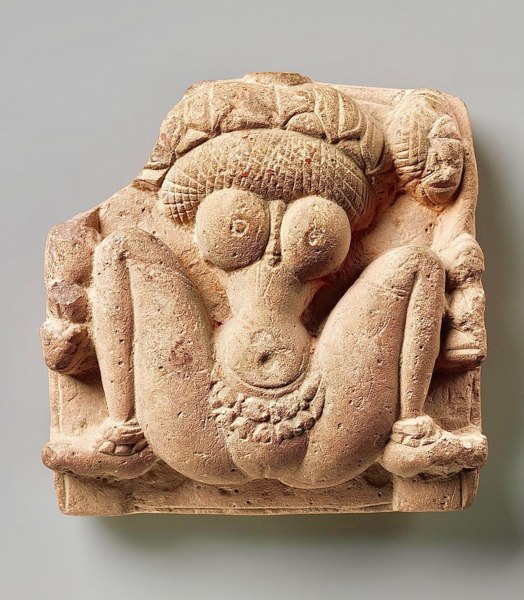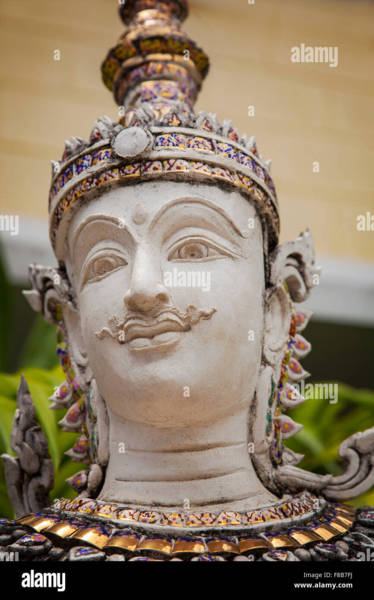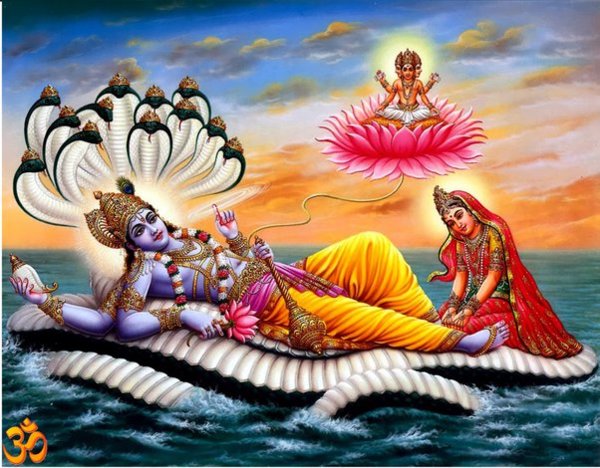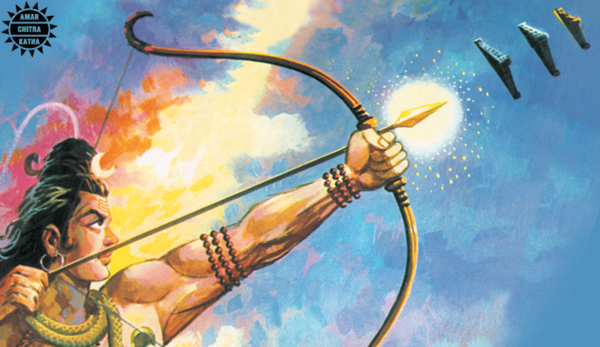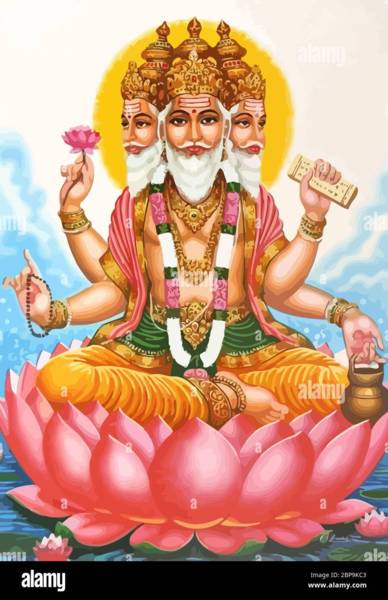

 字體:小 中 大
字體:小 中 大 |
|
|
|
| 2022/10/13 20:03:01瀏覽395|回應0|推薦10 | |
~ 繼續談 "想像力" : 甚麼都有正反兩面, 如一枚銅板的兩面. "想像力"也一樣. 當你主觀地想像超越"恐懼", 它即是"幸福" ; 反之若將"恐懼"放大 ~即是" 毀滅"的根源. . . . Bhaya means fear. And the greatest fear of all living creatures is death. Yama is the god of death. We fear him. We do not want to die. We want to survive. To survive, we need food. But to get food we have to kill. Only by killing a living creature can food be generated. The act of killing and the act of feeding are thus two sides of the same coin. Death ends up sustaining life. This is the truth of nature. Bhaya 的意思是"恐懼"。而所有生物最大的恐懼就是死亡。Yama 是死神。我們害怕他。我們不想死。我們想要生存。為了生存,我們需要食物。但是為了得到食物,我們必須殺戮。只有殺死一個生物,才能產生食物。因此,殺戮行為和餵養行為是同一枚硬幣的兩個方面。死亡最終是為維持生命。這是大自然的真理。 Fear of death creates the food chain comprising the eaters and the eaten. Fear of death is what make animals migrate in search of pastures and hunting grounds. Fear of death establishes the law of the jungle that might is right. Fear of death is what makes animals establish pecking orders and territories. Fear of death makes animals respect and yearn for strength and cunning, for only then they can survive. 對死亡的恐懼創造了由食者和被食者組成的食物鏈。對死亡的恐懼使動物遷徙以尋找牧場和狩獵場。對死亡的恐懼確立了強權是正確的叢林法則。對死亡的恐懼使動物建立了啄食順序和領地。對死亡的恐懼使動物尊重並渴望力量和狡猾,因為只有這樣它們才能生存 Such behaviour based on fear is appropriate for the beast, but not humans. Humans have imagination and hence the wherewithal to break free from animal instincts. Humans need not be territorial or dominating in order to survive. Humans need not form packs or herds in order to survive. Humans can break free from the frear of death, shatter the mental modifications emerging from time. Humans need not be predator or prey, victim or victimiser. 這種基於恐懼的行為適合野獸,但不適合人類。人類有想像力,因此有力量擺脫動物本能。為了生存,人類不需要領土或統治。人類不需要為了生存而形成群體。人類可以擺脫對死亡的恐懼,粉碎隨時間出現的心理變化。人類不必是捕食者或獵物、受害者或施害者。 Shiva reveals the power of the higher brain over the lower brain, the human brain over the animal brain. That is why he is called the master of animal instincts. He offers the promise of a world where there is no fear of scarcity or predator, in orther words no fear of death. Shiva offers immortality. 濕婆揭示了高級大腦的力道勝過低級大腦. 人類大腦勝過動物大腦。這就是為什麼人類被稱為動物本能之首。他提供了一個不懼怕稀缺或捕食者的世界的承諾,換句話說,不懼怕死亡。濕婆提供不朽。 Because humans have the ability to imagine, humans stand apart from the rest of nature. Humans therefore experience two realitities: the objective reality of nature and the subjective realityof their imagination. The former is Prakriti; the latter is Purusha. 因為人類具有想像的能力,讓人類與自然界的其他部分不同。因此,人類體驗到兩個現實:自然的客觀現實和他們想像的主觀現實。前者是Prakriti (客觀);後者是Purusha(主觀) 。 Prakriti is nature who has no favourites. Purusha is humanity that invariably favours a few over the rest. In art, Prakriti is visualised as the female body without the head while Purusha is visulizsed as the male head without the body. Prakriti 是一種沒有偏愛的天性。 Purusha 是一種總是在多數上偏愛少數的人性。 在藝術中,Prakriti 被形象化為沒有頭部的女性身體,而 Purusha 被形象化為沒有身體的男性頭部 The head is used to represent Purusha because the head houses the brain, which is the seat of imagination. The body without head then comes to represent Prakriti. 頭部用於代表Purusha,因為頭部容納大腦,大腦是想像力的所在地。 沒有頭的身體就代表了原質。
註: 這是個沒有頭的女人肉身. 有頭就有頭腦, 就是說有腦子. 女人從古就被形容成沒頭腦, 因為她的身子不受自我意識的控制, 而是受月亮潮汐的影響. 所以她代表大自然, 代表沒有自我的客觀. 她被形容為水. 柔軟如水可以接受, 亦可以為外界因素改變自我. 她是"客觀"的代表. 這裡 Prakriti 是 "自然" 的意思 也是 "客觀" 的意思 所以女人是沒有頭的女人身體
註: 這是個男人的頭. 頭代表主觀 因腦子是想像力的源頭 男人是受頭腦所指使的, 他是可以用意志來控制自然規律的. 所以男人只有頭沒身體. 代表的是"主觀". 在頭上加上鬍子, 這樣一眼就可分辨是男性. Nature creates and destroys life without prejudice. Human imagination is the seat of prejudice. It has two choices: to imagine a world without fear or to imagine a world with amplified fears. When the Purusha outgrows fear and experieces bliss, it is Shiva, the destroyer of fear. When Purusha amplifies fear and gets trapped in delusions, it is Brahma, the creator of fear. 大自然毫無"偏見"地創造和摧毀生命。 人類的想像力是"偏見"的根源。 它有兩個選擇:想像一個沒有恐懼的世界,或者想像一個恐懼放大的世界。 當Purusha超越恐懼並體驗幸福時,它就是濕婆,恐懼的毀滅者。 當 Purusha 放大恐懼並陷入妄想時,它就是 Brahma,恐懼的創造者。 註: 想想你內心的恐懼, 是不是大多是妄想? 也就是想像過了頭, 但是由於偏見, 你將它放大 ?? 放大到極限, 即是"毀滅"之源. 但是如果你用客觀角度或是主觀的想像力來超越你內心的恐懼, 就可以戰勝恐懼, 體驗安詳與喜悅. 你就是~濕婆 When one liverates oneself from the fear of death using faith, one becomes indifferent to death. Death then no longer controls us or frightens us. We are liverated. We achieve immortality. 當一個人用信仰擺脫對死亡的恐懼時,一個人就會變得對死亡漠不關心。 死亡不再控制我們或嚇唬我們。 我們就可解放。我們就可實現不朽。 註: 信仰對一個人是非常重要的. 它讓我們勇敢, 讓我們理性, 讓我們面對人生中的起落, 淡然. 讓我們頭腦清楚知道人生的目標, 這輩子來的目的. 讓我們慈悲. 讓我們能愛, 也能給, 更能享受這生命... Flesh is tangible but the soul is not. Flesh is fact but soul demands faith. Soul defines all laws of nature - it has no form, it cannot be measured, it cannot be experienced using any of the five senses. It is a self-assured entity that does not seek acknowledgment or evidence. One has to believe it. There is no other way to access it. Brahma has no faith. He refuses to look beyond the flesh. He ignores soul, and so catalyses the creation of ego. 肉是有形的,但靈魂不是。 肉體是事實,但靈魂需要信仰。 靈魂定義了自然的所有定律—它沒有形式,無法測量,無法使用五種感官中的任何一種來體驗。 它是一個自我就可存在的實體,不須尋求承認或者是證實。一個人必須相信它的存在。沒有其他方法可以實際接觸它。 Brahma 懷疑靈魂的存在, 他拒絕去探視除了肉體之外的存在。 他忽略靈魂,因此更加放大自我。 註: 人類自我為尊, 很難去接受他看不到又存在的現象 就如靈魂. 靈魂即是大自然, 人們不尊重大自然, 任意妄為. 還特意傷害它. 傷害的不只是大自然的本身而是大自然的規律. 讓人類自己也限於不可挽回的生存危機的地步.
The ego is the product of imagination. It is how a human being sees himself or herself. It makes humans demand special status in nature and culture. Nature does not care for this self-image of human beings. Culture, which is a man-made creation, attempts to accommodate it. "自我"是"想像"的產物。 這就是一個人如何看待自己。 這讓人類必須在自然和文化中持有特殊的地位. 自然並不重視人類這種自以為是的樣子。 文化是一種人造的創造物,人類試圖將他收納成它們想要的樣子。 註: 人類自我為尊, 自以為是, 想要操縱一切. 文化是由人類所創, 它只是一種人類想要的樣子的創造物. Brahma is every human being. He is described as emerging from a lotus. This is a metaphor for a child emerging out of the mothers womb. This is also a metaphor for the gradual unfolding of the imaginaton. Brahman 是每一個人。 他被描述為從蓮花中出現。 這是一個從母親子宮裡出來的孩子的比喻。 這也是"想像力"逐漸展開的隱喻。
Birth is not a choice. And survival is a stuggle, a violent struggle, plagued by fears of scarcity and predation. This is true for plants, animals and humans. But only humans can reflect on these fears and resent it and seek liberation from it. 生命不是一種選擇, 生存是一場掙扎,一場激烈的掙扎,總是被短缺和掠奪的恐懼所困擾。 對於植物、動物和人類來說都是如此。 但只有人類才能反思這些恐懼並憎恨它並尋求從中解脫。 Imagination makes Brahma think of scarcity in the midst of abundance, war in times of peace. Though he can rein in his fear, he ends up exaggerating fear. He assumes he has no choice in the matter. He doesnt have faith in God. He therefore does not discover soul, and finds himself alone and helpless before nature, a victim. Who is the cause of this misery, he wonders. Is nature the villain? 想像力使Brahma想到富足中的短缺,和平時期的戰爭。雖然他可以控制他的恐懼,但他最終誇大了恐懼。他認為他在這件事上別無選擇。他對上帝沒有信心。因此,他沒有發觉靈魂 , 只發現自己在自然面前孤獨無助,成為受害者。誰是造成這種痛苦的原因,他想知道。大自然是惡棍嗎? Who came first ~the victim or the villain, nature or humanity, Prakriti or Brahma? Objectively speaking nature came first. Nature is the parent. Humanity is the child. Subjectively speaking, however, imagination caused the rupture between humanity and nature, imagination forced Purusha to visualise itself as distinct from Prakriti. That makes nature the child. Humanity then is the parent. Thus Prakriti is both parent and child of Brahma. He depends on her for his survival, but she is not dependable. She is the cruel mother and the disobedient daughter. He feels ignored and abandoned and helpless and anxious. He blames her for this misery. In fear, he allows his mind to be corrupted. 誰先出現〜受害者或惡棍,自然或人性,Prakriti或Brahma?客觀地說,自然是先來的。自然是父母。人類是孩子。然而,主觀上來說,想像力導致了人與自然的斷裂,想像力迫使Purusha將自己想像為與Prakriti不同。這使自然成為孩子。那麼人類就是父母。因此,Prakriti 既是 Brahma 的父母也是孩子。他的生存依賴於她,但她並不可靠。她是殘忍的母親和不聽話的女兒。他感到被忽視、被拋棄、無助和焦慮。他將這種痛苦歸咎於她。在恐懼中,他允許他的心智被破壞。 註: 人類得依附自然才能生存. 但人類卻試圖控制自然, 改造自然, 成為他想要的樣子. 然而自然即是自然, 它不需要靠人類存活. 它有它自己的規律, 無法被人類修改, 改變. 若是它的規律被嚴重破壞了, 即是毀滅. 當人類對想要改造自然, 徒勞無功的時候, 他感到沮喪, 焦慮, 痛苦,無助, 甚至恐懼. 因自然的平衡被人類破壞, 人類的心智也將失去平衡. 想想現今人類最常出現的毛病: 自律神經失常. 是否與想要 "控制" 或者是 "改變" 而不成所產生的挫折, 困惑, 與恐懼心態有關??
Brahmas expectations of Prakriti are imaginary. Nature does not love him or hate him. Nature has no favourites. All creatures are equal in Prakrtis gaze. Because Brahma can imagine, he imagines himself to be special and so expects to be treated differently by nature. This is because of the ego. Brahmas 對 Prakriti 的期望是場幻夢。"自然"不愛他也不恨他。 "自然"沒有最愛。 在 Prakrtis 的注視下,所有生物都是平等的。 因為 Brahma 可以想像,他認為自己很特別,因此希望會受到自然不同的對待。 這就是因為"自大"。 註: 自然對待所有眾生萬物都是平等的. 但是因為人類具有想像力, 所以覺得自己很特別, 會受到不一樣的對待. 結果卻很失望. 因為在自然面前沒有偏心也沒有偏見, 它是客觀的, 公平的. Brahmas chase of Shatarupa thus entraps him. It is the movement away from stillness and repose towards fear and restlessness, symbolically described as a southern movement, away from the still Pole Star. To stop him, Shiva takes the form of a bowman and raises his bow, the Pinaka, and shoots an arrow to pin Brahma to the sky. In other words, Shiva stills the mind. Brahma追逐自然 使他陷入困境。讓他不再穩定, 卻走向恐懼和不安,他的活動就如遠離靜止的北極星向南方移動 。 為了阻止他,濕婆化身為弓箭手,舉起他的弓射出一支箭,將梵天釘在天空上。 換句話說,"濕婆"安定頭腦的轉動.
The bow is the symbol of concentration and focus and balance, in other words, it is the symbol of yoga. Yoga is a set of practices that stills the restless mind. It is what can pin the deer down. The word yoga comes from the root yuj, meaning to align. Fear destroys the alignment of the mind; rather than accept the reality of nature, the mind seeks to change and control it. These attempts invariably fail, creating frustration and fear and confusion that blinds one to spiritual reality. Yoga restores mental alignment so that nature is seen for what it is. Witnessing Prakriti will provoke the journey towards Purusha. Rather than blaming nature or clinging to the flesh, one will find refuge in atma. Shiva is therefore called Yogeshwara, lord of yoga. 弓是專注和平衡的象徵,換句話說,它是瑜伽的象徵。 瑜伽是一套能讓不安的心靈平靜下來的練習. 它就是可以把路跑的鹿釘住不動的東西. 瑜伽這個詞來自詞根yuj,意思是平衡。 恐懼破壞了頭腦的平衡;它不接受自然的真相 而是想要改變與控制它。 這種嘗試總是失敗,造成了 挫折、恐懼和困惑,使人看不到自然的真相。 瑜伽可以安定頭腦 讓人們看到自然的本來面目。讓人從主觀逐漸走向客觀的思維方式 不再怨天尤人 不再太過依附於這個肉身,能夠看見靈魂的存在 在靈魂處得到安詳 濕婆因此被稱為瑜伽之王 Yogeshwara。 註: 瑜珈是安定頭腦的箭, 濕婆神就是那個神箭手. 在那麼古老的時候, 修練頭腦的瑜珈就已經出現了, 實在是很不可思議. 濕婆神即是瑜珈的創建者. Shiva watches as Brahma sprouts four heads facing the four directions as he seeks to gaze upon Prakriti at all times in his attempt to control her. Brahma then sprouts a fifth head on top of the first four. These sprouting of heads refer to the gradual contamination of the mind, its knotting and crumpling with fear and insecurity as the desire to dominate and control takes over. Shiva 看著 Brahma 朝四個方向長出四個頭,他試圖隨時注視 Prakriti 以試圖控制她。然後,梵天在前四個頭上長出了第五個頭。這些頭的萌芽指的是心靈的逐漸污染,隨著支配和控制的慾望接管,它會因恐懼和不安全感而打結和皺縮。 註: 梵天 ( Brahma )向東西南北四方各有一個頭, 共四個頭. 代表人類頭腦動個不停, 顧及四面八方的動靜. 後來在梵天四個頭的頭上又長出一個頭, 這個頭代表著心靈的汙染. 它開始不安而出現皺縮, 和 打結. The first four face the reality of nature in every direction; the fifth simply ignores the reality of nature. It is the head of delusion. It is called aham, Brahmas imagination of himself, his self-image or ego. The fifth head of Brahma declares Brahma as the lord and master of Prakriti. This claim over nature is humanitys greatest delusion. 前四個頭面向各個方向的自然現實; 第五個完全忽略了自然的現實。 是妄想之首。 它被稱為aham,即是梵天對自己的想像,他的自我形像或自我。 梵天的第五個頭宣布梵天為自然的主宰。 這種對自然的要求是人類最大的錯覺。
註: 人類妄想至極, 自號為"自然主宰". Hoping to shatter this delusion, Shiva uses his sharp nail and wrenches off the fifth head of Brahma. Shiva severs the head that deludes Brahma into believing he created objective reality or Prakriti, when in fact, he has only ceated his own subjective reality, the Brahmanda. 為了打破這種幻想,濕婆用他鋒利的指甲擰下了梵天的第五個頭。 濕婆切斷了梵天的迷惑的腦袋,讓他相信客觀現實或自然定律,而事實上他只是創造出的自己的主觀現實,也就是"梵天定律"。 Prakriti is nature. Brahmanda is culture. Atma witnesses Prakriti, aham constructs Brahmanda. Prakriti 是自然。梵天定律是文化。 靈魂看得見自然定律,"自我" 創造出了 "梵天定律" 註: 人類說甚麼就是甚麼, 即是"梵天定律". ~~~ 待續 |
|
| ( 不分類|不分類 ) |



